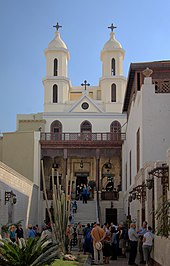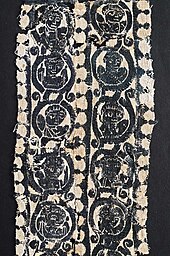Copts

Copts (from Greek Αἰγύπτιοι , Egyptians', through the Arabic قبط) are an ethno-religious group , with which the members of the Coptic churches are usually referred to. Originally, the term referred to those inhabitants of Alexandria and all of Egypt who used the Egyptian language as their idiom . In Roman, Byzantine and early Islamic times the word was used regardless of religious affiliation. The Coptic language emerged from Egyptian in the 3rd century AD. Since the increasing Arabization and Islamization of Egypt, the term has only been used for the Christians of the Coptic churches. Because of tensions between Copts and Muslims, which extend to the use of violence by Islamist groups, and the desire for economic improvement, many Copts have emigrated.
history
Copts in Egypt
All Egyptian- speaking inhabitants of Egypt were originally referred to as Copts . During the Islamic conquest of Egypt, the residents had to pay a poll tax ( jizya ) or convert to Islam. The group now known as the Copts are those who did not convert to Islam. Most Copts are part of the Coptic Orthodox Church , while a small proportion are Coptic Catholic , Protestant, or non-denominational.
Fluctuating figures
There are very different figures for the proportion of Christians in the Egyptian population. Most estimates are between 5 and 8 million (between 6 and 10% of the total population). The majority of them are Coptic Christians (mostly ancient Oriental Miaphysites , a small part Coptic Catholics ), the rest are divided between Greek Orthodox , Greek Catholic and Protestant Christians. The Fischer Weltalmanach names a higher number of 6 to 15% Copts.
Discrimination and violence against Copts
Copts are exposed to various forms of discrimination in Egypt : in everyday life, in government and military functions, and when building churches. Although the Coptic Christmas has been an official holiday since 2002, the Coptic Christians complain about social as well as state disadvantage and an increase in intolerant Islamic discourse. The Copts also felt they were marginalized by the Muslim Brotherhood government in 2012–2013 and not protected against acts of violence. As early as 2006, the human rights organization Human Rights Watch complained that Egyptians who convert from Islam to another religion could be arrested. Authorities would also refuse to register the change of religion.
In Upper Egypt in particular , the Copts are the target of acts of violence, the number of which rose sharply in the years up to 2011. In 2001, 21 Copts and one Muslim were killed in the massacres of el-Kosheh , in 2002 unrest broke out after the inauguration of a Coptic church and in 2006 one Copt was killed and 17 injured in attacks on three churches in Alexandria. At Christmas 2009, six Christians were shot dead by three assassins outside a church in Nag Hammadi . The human rights organization Initiative for Personal Rights counted around 60 such acts of violence against Christians between 2008 and 2010 alone. At least 21 people were killed in a bomb attack on a Coptic church in Alexandria on New Year's Day 2011. The Egyptian lawyer and director of the Al-Kalema Center for Human Rights (ACHR) Mamdouh Nakhla had already suggested two days after the attack that there might have been accomplices in the interior ministry. On May 7, 2011, Salafists attacked St. Mina Church in the Imbaba district of Cairo and set it on fire. In the course of fierce street battles in front of the church, twelve members of the religious communities - both Muslims and Coptic Christians - were killed and 230 people were injured. On October 9, 2011, at least 24 people were killed in a demonstration by Coptic Christians in Cairo. On April 9, 2017, attacks on Coptic Christian churches in Alexandria and Tanta killed at least 38 people and injured more than a hundred people. The terrorist militia IS claimed both attacks for themselves.
There are numerous other examples of persecution and violence against Copts . In the course of the revolution in Egypt in 2011 and the state crisis in Egypt in 2013 , Copts and Muslims were repeatedly killed, and numerous churches were looted or destroyed.
Copts in Europe
There are several Coptic communities in German-speaking countries:
Two Coptic monasteries, namely the Coptic Orthodox Monastery of the Virgin Mary and Saint Mauritius in Höxter - Brenkhausen , in which the Coptic Bishop General for Germany Anba Damian resides, and one in Waldsolms-Kröffelbach near Frankfurt am Main. Other communities exist in Berlin, Bitburg, Bremen, Düsseldorf, Frankfurt, Heidelberg, Hamburg, Holzwickede, Munich and Stuttgart.
A monastery in Obersiebenbrunn , near Vienna, which is a spiritual meeting place for Austrian Copts (see also web links); further communities exist in Vienna, Graz and Klagenfurt.
There are also larger municipalities in almost every European country (London, Birmingham, Paris, Milan, Rome, Stockholm and other larger cities in Europe).
Well-known Copts
- Aziz Atiya (1898–1988), coptologist and historian
- Boutros Boutros-Ghali (1922–2016), diplomat, politician and former UN Secretary General
- Youssef Boutros-Ghali (* 1952), Minister of Finance of Egypt from June 2004 to January 2011
- Albert Cossery (1913–2008), Francophone writer
- Anba Damian (* 1955), Bishop for Northern Germany
- Anba Gabriel (* 1959), Bishop for Austria
- Boutros Ghali (1846–1910), Prime Minister of Egypt 1908–1910
- Anba Michael (* undated), Bishop for Southern Germany
- Salama Moussa (1889–1958), famous writer and thinker of the Arab world
- Raouf Salama Moussa (1929–2006), bacteriologist and publisher
- Onsi Sawiris (* 1930), businessman, founder and head of the largest Egyptian group of companies, Orascom
- Naguib Sawiris (* 1954), entrepreneur and billionaire (eldest son of Onsi Sawiris)
- Samih Sawiris (* 1957), Egyptian-Montenegrin entrepreneur (2nd son of Onsi Sawiris)
- Kamal Stino (1910–1987), Vice Prime Minister under President Nasser
- Rami Malek (* 1981) is an American actor
- Mena Massoud (* 1991) is a Canadian actor
See also
- Coptology (research area on the Coptic language, culture, history and religion)
- Coptic art (folk art since Roman times)
- Abu Mena (UNESCO World Heritage Site in the Mariut Desert)
- C-TV Coptic Channel (Coptic Orthodox TV channel)
- Ethiopian Orthodox Tewahedo Church
literature
- Wolfgang Boochs: The Copts - Church of the Martyrs. Bernardus, Aachen 2015, ISBN 978-3-8107-0217-3 .
- Wolfgang Boochs: History and Spirit of the Coptic Church. 2nd Edition. Bernardus, Aachen 2009, ISBN 978-3-8107-9184-9 .
- Emma Brunner-Traut : The Copts - Life and Teaching of the Early Christians in Egypt. Diederichs, Cologne 1982.
- William Faragallah: The Coptic Christians of Modern-Day Egypt, a Documentation. Faragallah, Sulzbach 2012, ISBN 978-3-929682-99-1 .
- Heinz Gstrein , Paul Meinrad Strässle, Martyn Thomas, Adly A. Youssef: Copts in Egypt - A Christian Minority under Siege. Vandenhoeck & Ruprecht, Göttingen 2006, ISBN 978-3-525-54102-9 .
- SS Hasan: Christians Versus Muslims in Modern Egypt - The Century-Long Struggle for Coptic Equality. Oxford University Press, Oxford / New York 2003.
- Meir Hatina: In Search of Authenticity - A Coptic Perception. In: Middle Eastern Studies. Volume 42, No. 1, January 2006, pp. 49-65.
- Martin Mosebach : The 21 - A Journey to the Land of the Coptic Martyrs. Rowohlt, Reinbek near Hamburg 2018, ISBN 978-3-498045-40-1 .
- Siegfried G. Richter : The Coptic Egypt. Treasures in the shadow of the pharaohs (with photos by Jo Bischof). Scientific Book Society, Darmstadt 2019, ISBN 978-3-8053-5211-6
- Samuel Tadros: Motherland Lost - The Egyptian and Coptic Quest for Modernity. Hoover Institution Press, Stanford, CA 2013.
Web links
- Homepage: Coptic Orthodox Church in Germany. St. Markus Coptic Orthodox Church Frankfurt e. V.
- Homepage: The Coptic Orthodox Diocese in Austria and the German-speaking part of Switzerland. Coptic Orthodox Diocese in Austria.
- Homepage: Coptic Orthodox Church in Switzerland. Private website, 2007.
- Article: Egyptians Converted to Christianity - A Rare Species. In: Neue Zürcher Zeitung. September 3, 2007.
- Gundula Madeleine Tegtmeyer : Coexistence in Egypt: Against the Exodus. ( Memento from March 22, 2016 in the Internet Archive ) In: zenith . October 16, 2012.
Individual evidence
- ↑ Egypt under Arab rule (642-1517) - Arab conquest and early period of Arab rule (642-660).
- ↑ Randa Ali, "Alber Saber detained for political, not religious reasons" , Ahram Online
- ↑ Harenberg Aktuell (edited by Meyers and Brockhaus), p. 532: 94% Muslims versus 6% Christians in total (most of them Copts) / Spiegel-dtv-Jahrbuch 2004, p. 54: 90% Muslims versus 9% Copts / country information of the Foreign Office : 90% Muslims versus 6% Copts
- ↑ The Fischer World Almanac 2011 gives 6 to 15% Copts and 80% Muslims (15% Copts in 2009 and 2010), but in 2008 still listed 12–15% Copts and in 2006 listed 85% Muslims compared to 12% Copts and 2003 90% Muslims compared to 9-10% Copts (6 million out of 64 million). In the 1996 edition of Fischer WA, the proportion of Copts in the total population was given as 4.1%, in 1998 with 10.4%. The sources for this highly variable information are unknown.
- ↑ The Pope from Egypt. ( Memento from April 8, 2011 in the Internet Archive ) The Coptic Orthodox Church in Austria (at Internet Archive)
- ↑ Violence against Christians on the Nile , article in the Neue Zürcher Zeitung of June 17, 2013.
- ↑ Human Rights Watch : Essential Background: Overview of human rights issues in Egypt. ( Memento of November 14, 2008 in the Internet Archive ) December 31, 2005
- ↑ Car bomb attack on Coptic Church in Alexandria ( Memento from January 6, 2011 in the Internet Archive )
- ^ The situation of Christians in Egypt ( Memento of December 3, 2013 in the Internet Archive )
- ↑ Two convictions for the «El Kosheh massacre»
- ↑ Message: Religious unrest in Egypt: 34 arrests. ORF, February 11, 2002, accessed on July 19, 2018.
- ↑ The Disappearance of Justice
- ↑ Car bomb attack on Coptic Church in Alexandria ( Memento from January 6, 2011 in the Internet Archive )
- ^ Egyptian Security Guards Withdrew One Hour Before Church Blast, Say Eyewitnesses
- ^ Against Christians and “unbelieving” Muslims Frankfurter Allgemeine Zeitung, May 9, 2011.
- ^ Attacks on Coptic Churches in Egypt. In: DiePresse.com. April 9, 2017, accessed January 6, 2018 .
- ↑ Message: Terror in Egypt: Second attack on Christians - President Sisi convenes Security Council. In: Spiegel Online. April 9, 2017. Retrieved July 19, 2018 .
- ↑ Christof Haverkamp: Minister of Religion Zakzouk: Egypt's government does not need lessons from the Pope - "We protect Copts just like Muslims". In: New Osnabrück Newspaper. January 17, 2011, accessed July 19, 2018.
